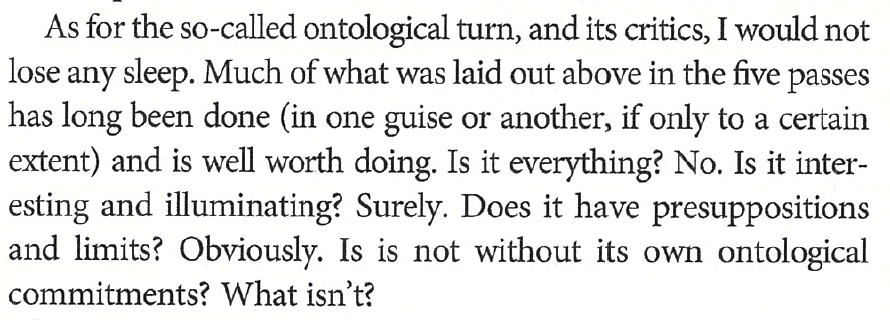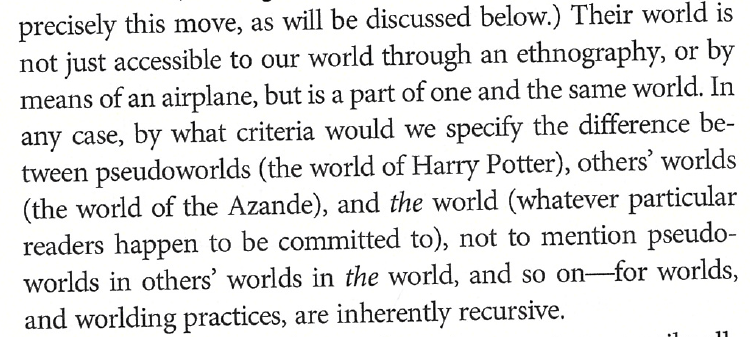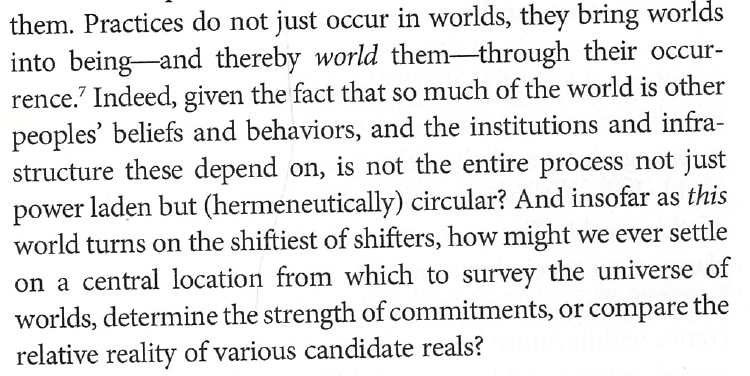Reaction to Paul Kockelman's 'Ontologies and Worlds'
Kockelman, Paul. 2024. ‘Ontologies and Worlds: The Price of Being Free’, Current Anthropology 65(5): 922–7. via journals.uchicago.edu

Kockelman introduces his article as follows:

Here is a link for the wikipedia entry on ‘ontological turn’. This is a play on the ‘linguistic turn’ describing philosophical fashions beginning a century ago. It passed me by.
I basically cannot stand ontological approaches so I began reading it with a feeling of apprehension.
My ontological distaste started with OOP or object-orientated-programming, which I think I first met when I looked at learning Java and then C++. I just thought it was not very innovated as I gritted my teeth in study. Not that I can program anything now, being over 50, but at least these OOP programmers at least knew they were constructing languages, and the ‘objects’ that instantiated their classes were the outcome of an epistemological method. [I hope that's clear].
People enjoy enjoying their ontologies. Super-enjoyers like grammarians think that correcting language errors helps fix the world, the epistemology of getting to those fixes usually escapes them.
This is why I rank epistemological methods over ontological stuff. We have too much stuff.
This is a naturalistic intuition on my part, that the models (objects) are maps and are not the territory. This is a bias most people do not share. Most think with our animal logic that reality is made of objects being themselves. I think that objects are things, which are a type of meeting (when not not an unmet map = virtual thing) and not being at all. Being is the ultimate ghost. The type of object a grammarian loves.
Anyway Kockelman covers this type of thing in his own way, and ends up in a similar epistemological place.

The five passes are worth a read as an introduction to ontologies as a way to know how many of us know, as outsiders inside and outback.
Then we get the play on Quine —well worth reading too. The comments on what might be classed as the ritual limitations of Quine’s account are great.
In recent weeks I been feeling the need to get over my reluctance to use the word ritual and so I have found an application for it.
The magic of ritual is not in the ritual’s intention (which is why I was positivistically averse to the word), but in the routine of habit. Its practice, if not practical outcome, in the world, real or not.
Belief is a type of ritual, as such it has no relation to truth in any analytic philosophical sense (the linguistic turn was a bit of over-steering on that word). When people ‘believe’ that the earth is flat, or god is love, or angry, they are not ‘propositioning that X’ at all. It’s more likely to be an item of clothing used to indicate belonging or exclusion. Fear and loyalty govern belief more than truth and error. It is dogmatic to claim it’s all about the dogma of reality. Reality doesn’t care about reality, why should any ontology? Sure you can be Kant and make ‘em care, or Heidegger and make ‘em be, but that is a construct that ignores it’s own performance of (self-)construction (and whether it’s conscious or unsubconscious delusion/distraction/deflection makes no difference).
This is also why I cannot stand Heidegger.
Back to the text which mentions Heidegger.
I like this:

Inherently recursive. Necker cubes of your favourite matroyshka doll being eaten by a rabbitduck.

All worlds are in the world. Separatists often engaged in paranoia to separated them out, but they will fail, no matter how much damage they do in their fear-based practices. The damage to the world lies in the self-fulfilling nature of paranoia.
(Rituals is a word I will use as a blur of belief/practices).
We return to Quine.

The essay is an excellent introduction to the world for those with a preference for ontologies over epistemologies, or vice versa.
The worlds are in the world. They only separate out if you ignore them, or exclude them, call them woke or say they do not exist, or forget to marry them, or declare then animals, or at least not human, because scary scariness.
This is bad worlding.
Crossposted on substack.com
